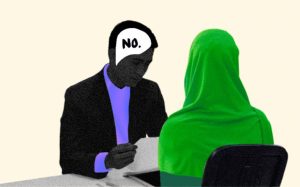 Moon Desk: Muslims make up nearly 14 percent of India’s 1.35 billion populations but do not have the same representation in government or private sector jobs.
Moon Desk: Muslims make up nearly 14 percent of India’s 1.35 billion populations but do not have the same representation in government or private sector jobs.
Multiple government-appointed commissions have found the community is at the bottom among India’s social groups in terms of education and employment.
One of those commissions, headed by now retired Justice Rajinder Sachar, found that India’s Muslims were disadvantaged in social, economic and educational terms. Less than 8 percent of them were employed in the formal sector compared with the national average of 21 percent, the commission said in its report.
According to 2011 census, the participation of Muslim women in jobs was less than 15 percent, whereas it was more than 27 percent for Hindu women. The corresponding figures for Buddhist and Christian women were 33 percent and 31 percent, respectively.
The situation has worsened since 2014 when Prime Minister Modi’s Hindu nationalist BJP came into power, with the government pursuing policies targeting the Muslim minority and their economic and religious rights.
An Academic and Activist Apoorvanand said, “The bias was always there but with the dominance of BJP and RSS, people have been now calling for the exclusion of Muslims from all the economic areas.”
He added that the objective of the Hindu right is to “cripple the Muslims economically, force them into a state of deprivation and constant want so that they turn into a permanent subjugated population”.
A study published in June by Led by Foundation, also revealed discrimination and bias against Muslim women in the hiring process for entry-level jobs in various sectors.
A similar study, “Being a Muslim at the Workplace” by Mumbai-based feminist collective Parcham, found that even in metropolitan cities such as New Delhi and Mumbai, Muslims continue to face prejudice in the formal sector.
The report noted that a scarcity of Muslim women in the formal sector points out to a systematic and institutionalized push towards an economic exclusion of Muslims.





